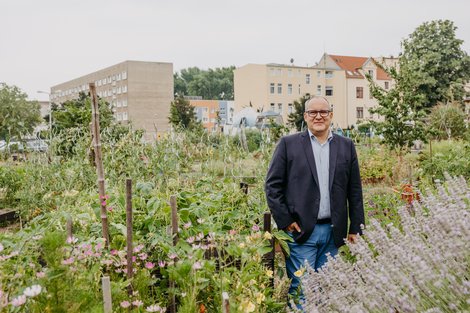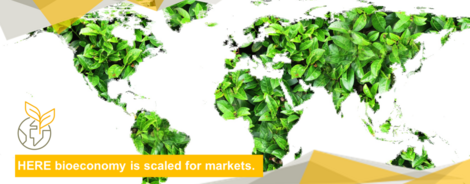Raising Awareness of the Sustainable Transformation

Researchers from Magdeburg analyze the conditions needed for the bioeconomy
As part of a wide-ranging study that began in 2017, political scientists from the Otto von Guericke University Magdeburg and the University of Hagen have identified the political processes that could lead to a biobased national economy. The final report from the joint “Bio-Ökopoli” project, which was funded by the German Federal Ministry of Education and Research, will be published in October.
The theme of the German Science Year 2020/21 is the bioeconomy and global challenges. Against this background, Prof. Dr. Michael Böcher from the Institute of Social Sciences in Magdeburg discusses in this interview the challenges that result from political conflicts, for example between economic interests and environmental concerns. However, he is also encouraging everyone to exploit the potential of the bioeconomy.
You have investigated the management of regional and European bioeconomic processes. What do you think the ideal bioeconomy policy should look like?
Prof. Dr. Michael Böcher: The ideal bioeconomy policy should aim to find the right balance between the different considerations and should lead to the bioeconomy being exploited in the best possible way. We do not want a bioeconomy at any price. It is important to take sustainability factors into account. The bioeconomy must not put biodiversity and the natural environment at greater risk.
When you talk about a lack of social, political and economic processes and compromises, are you working on the basis that the bioeconomy is essential?
Outsiders might perhaps get the impression that we are calling the bioeconomy into question, but exactly the opposite is true. I believe that the bioeconomy can make a major contribution to more resource-efficient production methods that will have a positive impact on climate change, for example. Certain processes offer a great deal of potential for innovation. In the bioeconomy there are some absolutely fascinating technological processes that can help us to do business in a more sustainable way. But there are also limits and conflicts over land use, protecting the environment and the interests of consumers. In our analyses and research we highlight the fact that the political conditions must be right in order to make industry future-proof.
What do you think are the key conflicts involved in achieving our bioeconomic goals?
There is significant potential for conflict over the issue of where the biomass should come from if we intend to convert our economy, including all the areas of each individual value-added chain, to sustainable raw materials. To produce large volumes of biomass we need large amounts of arable land. However, monocultures do not support biodiversity and result in conflicts with agricultural production and the protection of the natural environment. A number of different interests are involved, and there is only a limited amount of land. Unfortunately, one current way out of this problem is often to import biomass, which means shifting the conflict to other countries. Given the growing shortage of resources and agricultural land, the rising global population, climate change and the loss of species – the global challenges – this is not an acceptable solution. The bioeconomy must be more than simply regional and national. It must always be considered from the perspective of its supra-regional and global consequences.
How could individual areas of the economy be transformed quickly and reasonably?
The government needs to set priorities. One example is the discussion about bioenergy. There has been a lot of hype about generating as much bioenergy as possible from wood. Then the industry began to make itself heard. The manufacturers wanted to produce high-quality products from the good timber rather than burning it to generate energy. The result of this conflict has been the approval of the cascade use of wood. Energy will be generated from waste products that would not be used in the production process. It is simply a case of making sure that we have discussions of this kind.
One of the intended results of your study was to set up university courses that would raise awareness of political and social conflicts within the bioeconomy. What has happened about this?
We have worked with the University of Hagen, which is a distance-learning institution, to develop an online seminar on bioeconomy policies. This has been available there and at Magdeburg University since the start of the current summer semester, despite the fact that Magdeburg is a brick-and-mortar university. When the coronavirus pandemic began, we had luckily chosen just the right teaching format and were able to use the seminar. We made the students aware that the bioeconomy involves many different policy areas. Bioeconomy policy has interfaces with agricultural, economic, technology, climate, environmental and conservation policy and also with consumer protection.
Do you think Saxony-Anhalt can offer the right conditions for establishing a sustainable bioeconomy?
The bioeconomy is important for Saxony-Anhalt, and the research landscape here is in a very strong position. I am highly in favor of setting up a federally and state-funded bioeconomy cluster here. One important indicator is the state government’s regional innovation strategy, which clearly states that the chemical industry and the bioeconomy are among the key markets in the region. A significant future consideration is that on July 3 the Bundestag and Bundesrat, the lower and upper houses of the German parliament, passed the acts on the phase-out of coal and on the structural reinforcement of the regions affected by the phase-out of coal. One of the most important projects in Saxony-Anhalt is the creation of a bioeconomy hub as a center for sustainable chemical production in central Germany. Regional structural funding for the phase-out of coal will be invested in measures to bring together research institutes and large and small companies around the cluster and the hub. This is an important means of future-proofing the economy of Saxony-Anhalt. Innovation is an essential part of economic development. If we invest in innovation areas of this kind in Saxony-Anhalt, this may well encourage other companies to move to the area and create jobs.
The European Green Deal is also currently under discussion. What is your view of this?
The EU Green Deal is very welcome because it makes it clear that Europe will be the first continent to become climate neutral. However, we need to wait and see how it will be implemented by the individual member states. I find it remarkable that the European Commission has launched its Green Deal, with actions to combat climate change and protect the environment, at precisely the moment when structural measures are being taken to counteract the negative effects of the pandemic. The economic support needed as a result of the pandemic is not being played off against climate protection. Instead it is being clearly stated that we need the Green Deal precisely because of the pandemic. It is obvious that we do not want economic support of this kind to be provided at the cost of the environment. We should be combining it with measures to combat climate change.
Author: Manuela Bock/IMG Saxony-Anhalt

Sustainable economic growth requires the responsible use of resources. This is a reality in Saxony-Anhalt: more than half of gross electricity production comes from renewable sources of energy.
> Learn more about bioeconomy in Saxony-Anhalt and the strength of Saxony-Anhalt as a location for bioeconomy.
